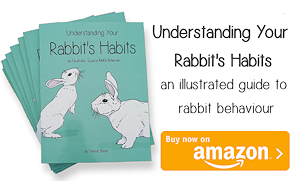Rabbit Food Bowls & Dispensers
Before you pick a bowl for your rabbit, it helps to think about what your rabbit will be eating and how. Rabbit's naturally spend a lot of their time eating; in the wild they would spend hours hoping around grazing on grass and hunting out tasty shoots and leaves. The way you provide food to your pet bunny can have a big influence on their well-being. By using food to encourage natural behaviour like foraging, you will help keep your rabbit's body fit and their brain active.
For more information on what to feed, see the diet & nutrition section.
There are a few options for presenting your bunny's food...
Food Bowls
A bowl is one of the first things most owners get when kitting out their new rabbit's cage. There are plenty to choose from - any heavy duty plastic or ceramic bowl will work and you can find a wide range of designs if you'd like something posh or snazzy.
If your rabbit's cage has more than one level, I'd suggest going for plastic or a coop cup attached to the mesh, as ceramic will shatter if thrown down a ramp - something rabbit's are prone to doing with their dishes. They also work well for rabbits that kick their litter around or poop in their bowl.
Rabbit's only need a very limited amount of pellets, most rabbit food dishes can hold several times the amount of pellets a rabbit should eat so don't get a big bowl if you feel it will guilt you into topping it up too much. If you want to feed fresh vegetables in a bowl, a wide/shallow dish or plate works best.
The downside with bowls is they make everything very easy for your rabbit; the food is in exactly the same spot and requires no effort to obtain. Don't feel you have to have a bowl, there are some options for feeding that encourage more natural foraging/eating patterns - my own rabbits haven't had bowls for years!
Food Ball/Dispenser
Instead of just putting your rabbit's food in a bowl, there are a range of products that encourage rabbit's to put a bit more effort into mealtimes. For dry food, a treatball is excellent. These encourage your rabbit to work for his food, exercising his brain and body, by making them nudge and manipulate a hollow ball to get food to fall out. I would definitely recommend one of these over a bowl, as they are one of the most played with 'toys' my rabbits have had. Although they are sold as 'treat' balls, just put your rabbit's normal dry food ration in rather than treats, so your rabbit can have lots of fun without the risk getting fat from extra food.
There are lots of different toys that can be bought or made which you can add your rabbit's daily pellets ration to so that your rabbit's mealtimes are like a treasure hunt. See the enrichment section of my blog for ideas. Rotating different toys for different days and meals will help keep your rabbit interested and challenged so they don't get bored.

100 Food Safe Paper Bags (£1.50 Amazon)
Paper bags (suitable for food use) stuffed with hay and pellets are cheap, simple and fun.
Fresh Food 'Bowls'
There are alternatives for fresh foods too, such as hanging basket that you can fill with fresh food or a skewer that leaves and chunks of vegetable can be threaded on to. By adjusting to the height you can encourage your rabbit to stretch and work for his food. A simpler homemade option would be to use a peg to attach leaves to the cage mesh.

Kabob/Skewer
(£4 Amazon)
A skewer with screw end cap you can thread fresh veggies on to and hang up.
Nothing at all!
Something to contain dry food is not actually necessary at all. 'Scatter feeding' is another way to encourage your rabbit to work for his food. This simply involves scattering the food in their enclosure so they have to hunt it out. This also works well for rabbits that have food related aggression as they don't have a food bowl to focus their territorial behaviour on. You can also handfed food, as a reward for training or just treats, again using your rabbits dry food (which most rabbits consider very tasty) as the treat helps prevent weight gain, and hand feeding will help you bond with your rabbit.
Rabbit Dry Food Storage
In addition to something for your rabbit to eat out of, you may like to get something to store food in. Using an airtight container will help food keep longer, particularly important if you want to buy in bulk to save money. A storage box or container designed for human foods works well for rabbit food too. Storing the food this way also makes it harder for your rabbit to help himself by chewing through the bag if you accidently leave it in reach.






















